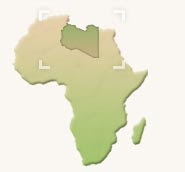A very interesting article from International Herald Tribune on Libya …. Libya just unveiled an important ecotourism project covering renewable energy, waste recycling … Enjoy the reading …
Here in this remote eastern region of Libya whose bleak hills resemble a lunar landscape, the Green Mountain Sustainable Development Area is the latest in a spate of Libyan projects that form a sort of global coming-out party for a country that for decades was a pariah.
Over the weekend, fleets of white Mercedes vans ferried hundreds of guests along newly paved roads for a lamb dinner among the ruins and signing ceremony, presided over by Saif al-Islam el-Qaddafi, the son of President Muammar el-Qaddafi, on Monday. In an area where many people are illiterate, newly erected signs in crisp white and blue say “Airport” in Arabic and English. Development is definitely coming to town.
A group of wealthy Libyans and a bevy of consultants are planning to create a carbon neutral green development zone in Cyrene, an area the size of Wales centered on ancient Greek ruins. It will cater primarily to tourism and serve as a model for environmentally friendly design, they say.
But the intention is clearly broader than that. “They want to show the world that Libya has turned a corner – that they can fit into the modern world,” George Joffe, an expert on Libya at Cambridge University, said in a telephone interview.
Saif Qaddafi referred to this important subtext in a press conference Monday. “In our area, it’s not common practice to talk about environment and emissions and the like,” he said in English, surrounded by slick architectural models displayed in a Greek gymnasium dating from the seventh century B.C. “It’s time now to join developed countries, so we make this statement about the environment, about culture.”
Over the weekend, fleets of white Mercedes vans ferried hundreds of guests along newly paved roads for a lamb dinner among the ruins and signing ceremony, presided over by Saif al-Islam el-Qaddafi, the son of President Muammar el-Qaddafi, on Monday. In an area where many people are illiterate, newly erected signs in crisp white and blue say “Airport” in Arabic and English. Development is definitely coming to town.
A group of wealthy Libyans and a bevy of consultants are planning to create a carbon neutral green development zone in Cyrene, an area the size of Wales centered on ancient Greek ruins. It will cater primarily to tourism and serve as a model for environmentally friendly design, they say.
But the intention is clearly broader than that. “They want to show the world that Libya has turned a corner – that they can fit into the modern world,” George Joffe, an expert on Libya at Cambridge University, said in a telephone interview.
Saif Qaddafi referred to this important subtext in a press conference Monday. “In our area, it’s not common practice to talk about environment and emissions and the like,” he said in English, surrounded by slick architectural models displayed in a Greek gymnasium dating from the seventh century B.C. “It’s time now to join developed countries, so we make this statement about the environment, about culture.”
For the inauguration ceremony, hundreds of people were flown to a remote landing strip Sunday night for a party and signing ceremony, with music piped in from the Temple of Zeus at sunset. Experts on waste recycling and sustainable farming, architects, engineers, and hoteliers mingled with royalty. All were hoping to play a role in the project.
On paper, the Green Mountain project is ambitious – although on paper is the only place it exists – and even many here expressed some skepticism that the project would materialize.
Its energy is to come from the wind and solar power. Its waste is to be recycled, its trash converted to biofuel. Its buildings – resorts, hotels, villas and villages for locals – are to blend seamlessly into the rugged landscape.
Its energy is to come from the wind and solar power. Its waste is to be recycled, its trash converted to biofuel. Its buildings – resorts, hotels, villas and villages for locals – are to blend seamlessly into the rugged landscape.
The plan will protect Libya’s fantastic Greek and Roman ruins, as well its fragile coastal ecosystem – one of the last remaining natural areas of the Mediterranean – from the perils of haphazard development. The idea is that as Libya opens to the outside world, it will not become “like the Spanish coast,” said the project’s financial adviser, Mahmoud Khosan. It will also be a good investment.
